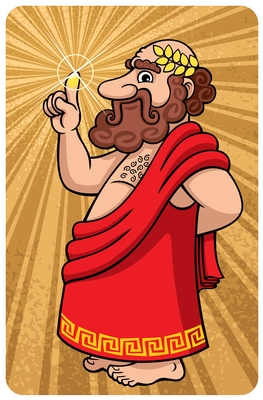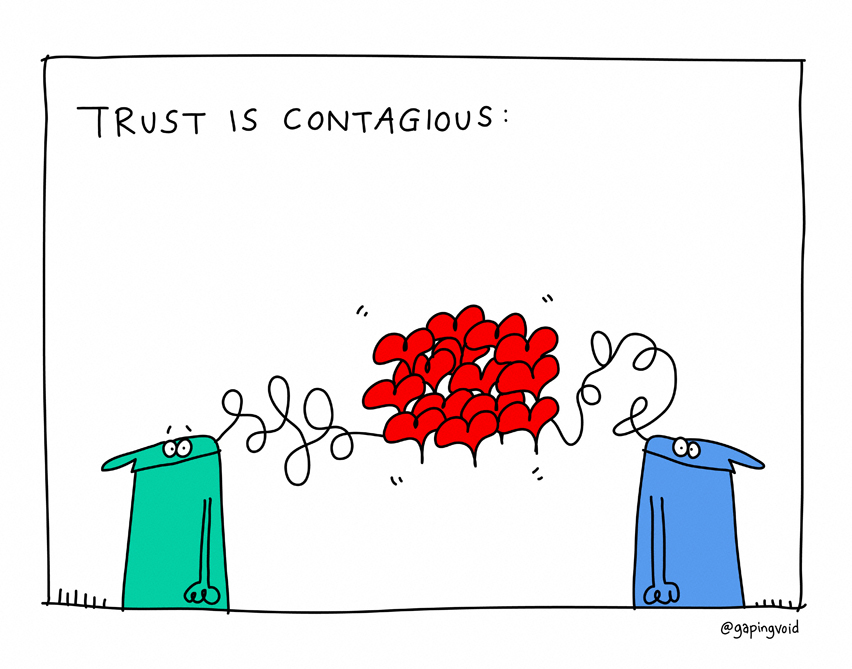Why Tell Stories?

In the last 60 seconds, here's what happened:
168 million emails were sent, 700,000 Google searches were launched, and 60 hours of YouTube videos were uploaded, not to mention all the spam, banner ads, phone calls, Facebook posts, tweets, texts, and telemarketing calls that found their way to your doorstep.
A whopping 90% of all data in the world has been generated in the past two years alone. Think about this: Before the dawn of civilization, approximately 5 exabytes of information had been created. Now, that much information is created every two days!
The common term for this head-spinning phenomenon is "information overload" -- the inability to absorb and process all of the information we are exposed to.
And while the gory statistics change every nanosecond, the results are the same -- leading to what is increasingly being referred to as "Information Fatigue Syndrome" (IFS) -- a condition whose symptoms include poor concentration, depression, burnout, hostility, compulsive checking of social media, and falling into trance-like states.

This describes the mindset of many, if not all, of the people you are attempting to influence on a day-to-day basis, be they customers, clients, friends, voters, volunteers, children, or your mother-in-law.
If you are committed to delivering a meaningful, memorable message to another human being, the burning question you need to be asking is this: "How can I cut through all of the background noise so my message can heard and remembered?"
Fear not. It's possible. According to neuroscientists, psychologists, theologians, sociologists, advertisers, linguists, and marketers, the answer is a simple one: storytelling.
Storytelling is the most effective, time-tested way to transmit meaning from one human being to another. It's been going on since the beginning of time when our first ancestors stood around the tribal fire. It's how civilizations pass on their wisdom to the next generation. It's how religions pass on the sacred teachings of their faith. And it's how parents, via the telling of fairy tales, transmit the values they want to impart to their children.
Here are just a few of the reasons why storytelling is so powerful:
It quickly establishes trust and connection between the speaker and listener.
It increases receptivity, captures attention, engages emotions, and allows the receiver to participate, cognitively, in the narrative.

It communicates values, not just skills, decreases teaching time, builds community, ignites five more regions of the brain than mere fact giving, helps people make sense of their world, shapes perceptions via the subconscious mind, reframes frustration, paradox, and suffering, changes behavior, and provides a dependable way for people to remember, retrieve, and retell a meaningful message.
Think about a message you want to communicate to someone today. How might you do that via story, instead of overloading them with more information, statistics, and pep talks?
Storytelling at Work
Storytelling for the Revolution
My storytelling blog
Posted by Mitch Ditkoff at 06:10 PM | Comments (0)
July 30, 2020ON TRUST: Do I Have Your Best Interests at Heart?
Here's a two-minute video on trust -- Jim Knight addressing a key component of this most important topic: "Do I have the best interests of the other person at heart?" In other words, are we being truly benevolent and caring towards "the other?" People can pick up on this vibe in a nano-second. It's not so much what we say. It's what we do. And it's not so much what we do. It's who we are. That's where trust emanates from. And if who we are is infused with authentic caring, selflessness, and empathy, everything else will follow...
Big thanks to Evla Han for the heads up
Brene Brown on Trust
Idea Champions
Posted by Mitch Ditkoff at 12:24 AM | Comments (0)
July 29, 2020BRAVING: A Deeper Dive Into What Real Trust Is All About
Here's a very lucid 10-minute video from Brene Brown on trust. "Braving" is her acronym for what she considers to be the key elements of trust: Boundaries, Reliability, Accountability, Vault (confidentiality), Integrity, Non-Judgment, and Generosity of intent (i.e assuming the best in others).
37 inspiring quotes on trust
Idea Champions
MitchDitkoff.com
Posted by Mitch Ditkoff at 09:41 PM | Comments (0)
July 28, 202037 Great Quotes on Trust

If you are a member of a team, there will be times when trust flies out the window. Your willingness to rely on others to do the right thing will shrivel. Such is life. But just because trust shrivels, doesn't mean it's gone. Smaller? Yes. Gone? Not necessarily. It can be restored. Indeed, it must be restored -- that is, IF you have any aspirations to enjoy life, your work, and the possibility of making a difference in the world.
"You must trust and believe in people, or life becomes impossible." - Anton Chekhov
"Earn trust, earn trust, earn trust. Then you can worry about the rest." - Seth Godin
"The best way to find out if you can trust somebody is to trust them." - Ernest Hemingway
"Trusting is hard. Knowing who to trust, even harder." - Maria Snyder
"He who does not trust enough will not be trusted." - Lao Tzu
"Whoever is careless with the truth in small matters cannot be trusted with important matters." - Albert Einstein
"Trust is the glue of life. It's the most essential ingredient in effective communication. It's the foundational principle that holds all relationships." - Stephen R. Covey
"Remember teamwork begins by building trust. And the only way to do that is to overcome our need for invulnerability." - Patrick Lencioni

"People follow leaders by choice. Without trust, at best you get compliance." - Jesse Lyn Stoner
"To be trusted is a greater compliment than being loved." - George MacDonald
"It takes 20 years to build a reputation and five minutes to ruin it." - Warren Buffett
"We are all mistaken sometimes. Sometimes we do wrong things, things that have bad consequences. But it does not mean we are evil, or that we cannot be trusted ever afterward." - Alison Croggon
"Never trust the advice of a man in difficulties." - Aesop
"Trust is the lubrication that makes it possible for organizations to work." - Warren Bennis
"The best proof of love is trust." - Joyce Brothers
"A king who trusts no man is weak." - Patricia Briggs
"Trust no friend without faults." - Doris Lessing
"Creativity comes from trust. Trust your instincts." - Rita Mae Brown
"People that have trust issues only need to look in the mirror. There they will meet the one person that will betray them the most."
- Shannon L. Alder
"It is more shameful to distrust our friends than to be deceived by them." - Confucius
"Those who trust us educate us." - George Eliot
"I'm suspicious of people who don't like dogs, but I trust a dog when it doesn't like a person." - Bill Murray

"I believe in trusting. Trust begets trust. Suspicion is foetid and only stinks. He who trusts has never yet lost in the world." - Mahatma Gandhi
"Trust is like a vase. Once it's broken, though you can fix it, the vase will never be same again." - Walter Anderson
"Distrust all in whom the impulse to punish is powerful." - Friedrich Nietzsche
"Trust in what you love, continue to do it, and it will take you where you need to go." - Natalie Goldberg
"I don't trust anyone who doesn't laugh." - Maya Angelou
"When a gifted team dedicates itself to unselfish trust and combines instinct with boldness and effort, it is ready to climb." - Patanjali
"Love cannot live where there is no trust." - Edith Hamilton
"Trust yourself, you know more than you think you do." - Benjamin Spock
"I trust no one, not even myself." - Joseph Stalin
"Trust is not the same as faith. A friend is someone you trust. Putting faith in anyone is a mistake." - Christopher Hitchens
"Trust is earned when actions meet words." - Chris Butler
"Trust is not simply a matter of truthfulness, or even constancy. It is also a matter of amity and goodwill. We trust those who have our best interests at heart, and mistrust those who seem deaf to our concerns." - Gary Hamel
"I believe in trusting men, not only once but twice -- in giving a failure another chance." - James Cash Penney
"I would rather trust a woman's instinct than a man's reason." - Stanley Baldwin
"The leaders who work most effectively, it seems to me, never say I And that's not because they have trained themselves not to say I. They don't think I. They think we. They think team. They understand their job to be to make the team function. They accept responsibility and don't sidestep it, but we gets the credit. This is what creates trust, what enables you to get the task done." - Peter Drucker
"I'm not upset that you lied to me. I'm upset that from now on I can't believe you." - Friedrich Nietzsche
"Trust is built with consistency." - Lincoln Chafee
"The inability to open up to hope is what blocks trust, and blocked trust is the reason for blighted dreams." - Elizabeth Gilbert
"Either we're a team or we aren't. Either you trust me or you don't."
- Ally Carte
"There's never a reason to trust someone. If there's a reason, then it's not trust." - Gerald Morris
"Just trust yourself, then you will know how to live." - Johann Wolfgang von Goethe
FOR YOUR REFLECTION:
1. How much do you trust yourself?
2. Who is the person you trust the most in your life?
3. What are the attributes of the person you trust the most?
4. How trustworthy are you?
5. When people lose trust in you, do you know why?
6. Who, in your life are you not trusting these days?
7. Do you know why you are not trusting this person?
8. Are you (and that person) committed to restoring trust?
9. What's the level of trust on whatever teams you are on?
10. If you are a team leader, how much do team members trust you?
11. What do you need to do to regain the trust of others?
12. What is the simplest thing you can do to be more trustworthy?
MitchDitkoff.com
Illustration: gapingvoid
Posted by Mitch Ditkoff at 04:27 AM | Comments (0)
July 26, 2020The Real Organizational Chart?

One reason why there isn't more innovation in most of our lives is because too many of us are working on our own. Not a good idea. Pause for a moment and identify at least one person with whom you need to collaborate. Who is it? What role will they play? And when will you ask for their support?
Start your idea factory
Idea Champions
Posted by Mitch Ditkoff at 12:54 PM | Comments (3)
July 23, 2020It's All a Matter of Perspective
Here's a two-minute video that delivers a very powerful message in a very simple way. If you are collaborating with anyone these days and tend to "see things differently" and your seeing things differently results in some interpersonal breakdowns, this one's for you.
Idea Champions
MitchDitkoff.com
Posted by Mitch Ditkoff at 01:23 AM | Comments (0)
July 10, 2020THE FIRST 20 HOURS: How to Learn Anything
Wanna learn something new? Good! Start here. This 19 minute TED Talk demystifies the process of learning anything new. No, you don't need 10,000 hours to master a new skill. Much less. HINT: The biggest obstacle to learning anything new isn't intellectual. It's emotional.
MitchDitkoff.com
IdeaChampions.com
Posted by Mitch Ditkoff at 01:42 AM | Comments (0)
July 09, 2020The DNA of Idea Champions Workshops and Trainings

Most people think that the ability to be innovative is a mystical state available only to the chosen few.
The effort, they imagine, takes a lot of time and hard work. And since they don't have time and don't like hard work, they reason that innovation just isn't in the cards for them.
But innovation is not a mystical state. It's a natural state -- a human birthright. The people in your organization, in fact, already are innovative. The only thing is: their natural ability to be innovative is being obscured by their own habits of mind and a variety of bothersome organizational constraints.

Their challenge is the same one as seeing the "hidden" arrow in the FedEx logo (look between the "E" and the "X").The arrow has always been there, but most people never notice it.
This is the work of Idea Champions. We help people see what they already have, but don't know how to access.
We help people make meaningful adjustments of vision, insight, and perception so they can acknowledge, embrace, and apply their innate ability to be more creative on the job -- and, for those clients who want to reinvent their "innovation process", we help them figure it out.
What follows is a brief summary of how we do this...
1. Know Thy Customer:
Long before we ever get into a room with participants, we do our due diligence -- learning about WHO we are serving, WHAT they expect, and HOW our time with them will be the most significant.
Sometimes this takes the form of phone interviews. Or online polls. Or studying key documents our clients send us in order to understand their current reality, industry, business challenges, organizational constraints, and hoped for outcomes.
2. Customization:
Based on our assessment of our client's needs, we put together a game plan to get the job done. Towards this end, we draw on more than 100 "innovation-sparking" modules we've been developing since 1986.
3. Co-Creation:
Early in the design process, we invite our clients to give us feedback about our approach. Their feedback stirs the creative soup and provides us with the input needed to transform a good session design into a great one.
4. Spacing In:
We make a great deal of effort to ensure that the space in which our sessions take place are as ideal as possible. Form may follow function, but function also follows form.
When participants walk into an Idea Champions session, they begin "mind shifting" even before the session begins. It is both our belief and experience that culture/environment is a huge X factor for creativity and innovation.
5. Drive Fear Out of the Workplace:
W. Edwards Deming, one of America's most revered management consultants, was a big proponent of removing fear from the workplace. So are we. Towards that end, each of our sessions begins with a norm-setting process that makes it easy for participants to establish a dynamic culture of innovation for the day.

6. Mindset:
Organizations don't innovate, people do. But not just any "people." No. People who are energized, curious, confident, fascinated, creative, focused, adaptive, collaborative, and committed.
People who emerge from our sessions are significantly more in touch with these "innovation qualities" than when they began. Their minds have changed. They see opportunities when, previously, all they saw were problems.
They let go of perfectionism, old paradigms, and habitual ways of thinking. In their place? Open-mindedness, listening, idea generation, original thinking, full engagement, and the kind of commitment that drives meaningful change.
7. Balancing Polarities:
Human beings, by nature, are dualistic, (i.e. "us" vs. "them," "short-term" vs. "long-term," "incremental" vs. "breakthrough," "left brain" vs. "right brain".)
The contradictions that show up in a corporate environment (or workshop) can either be innovation depleters or innovation catalysts. It all depends how these seeming conflicting territories are navigated. Idea Champions is committed to whole-brain thinking -- not just right brain or left brain thinking.
Our work with organizations has shown us that one of the pre-conditions for innovation is a company's ability to strike the balance between these polarities.
Each workshop we lead and each consulting engagement we commit to is guided by our understanding of how to help our clients find the healthy balance between the above-noted polarities.
8. Expert Facilitation: "A rock pile ceases to be a rock pile when someone contemplates it with the idea of a cathedral in mind," wrote St. Exupery.
This, quite simply, is what Idea Champions does. But we do far more than just contemplate. We also architect and build.
Since 1986, we've been facilitating innovation-sparking engagements for a wide variety of industries. We have mastered the art and science of turning lead (or leaders) into gold. And we can train your people to do the same thing we do.
9. Experiential Challenges: "What I hear, I forget. What I see, I remember. What I do, I understand."
So said the great Chinese sage, Confucius. This 14-word quote describes the essence of our work. Simply put, we get people off their "ifs, ands or buts," and into the experience of what's possible.
While we value theory, research, models, data, best practices, business cases, and most of the other flora and fauna of business life, we've come to understand that the challenge of sparking insight, breakthrough, and change, is best accomplished by doing -- not talking.
That's why all of our sessions include experiential challenges that provide participants with visible ways of seeing innovation in action -- what supports it and what obscures it.
10. Emergent Design: Awakening the creativity of an organization's workforce is not a follow-the-dots exercise.
Although all of our interventions begin with carefully crafted project plans and agendas, our facilitators are fluent in the art and science of making the kind of real-time adjustments, refinements, and improvisations that are the difference between a good session and a great session.
Facilitators who attempt to imitate our approach find it difficult to succeed without first learning how to master the art of emergent design. The good news is that it can be learned -- and this is just one of the things we teach in our Train the Trainer programs.
11. Edutainment: Idea Champions sessions are a hybrid of two elements: education and entertainment. We know that when participants are enjoying themselves their chances of learning increase exponentially.
That's why we make all of our sessions a hybrid of education and entertainment. Participants do not get tired. They do not get bored. They do not sneak long looks at their smart phones.
12. Full Engagement: Idea Champions sessions are highly participatory. Our facilitators are skilled at teasing out the brilliance of participants, regardless of their social style, job title, or astrological sign.
But perhaps more importantly, our facilitators know how to help participants tease out each others' brilliance. Eventually, everyone gets into the act. The shy people take center stage and the power players take a back seat. The collective wisdom in the room gets a much-needed chance to be accessed and expressed.
13. Convergence: Idea Champions is successful because what we do works. And one of the reasons WHY it works is because our sessions help participants translate ideas into action.
Ideas are powerful, but they are still only the fuzzy front end of the innovation process. Ultimately, they need to turn into results. Creativity needs to be commercialized. Our workshops, trainings, and consulting interventions help our clients do exactly that.
14. Tools, Techniques, and Takeaways: Ideas Champions closes the gap between rhetoric and reality. We don't just talk about innovation or teach about it -- we spark the experience of it. And we do that in very practical ways.
One way is by teaching people how to use specific, mind-opening techniques to access their innate creativity. Another way is by providing our clients with a variety of innovation-sparking guidelines, processes, and materials that can be immediately used on the job.
Idea Champions
Creating a Culture of Innovation
Storytelling at Work
Brainstorm Facilitation Training
What our clients say
Posted by Mitch Ditkoff at 04:06 PM | Comments (1)
July 07, 2020DANIEL PINK: The Surprising Truth About What Motivates Us
What does it take to learn anything some from somebody else?
Idea Champions
Posted by Mitch Ditkoff at 10:48 AM | Comments (0)
















